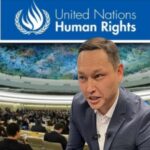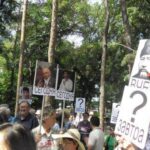The international human rights instruments contain a number of provisions on reasonable restriction of individual rights and freedoms by the state with the aim of achieving a balance between the rights of a person and the interests of the society.
The criteria for legitimate restriction of individual rights and freedoms were first set in the 1948 Universal Declaration of Human Rights (UDHR)[1]. In accordance with the Article 29 of the UDHR “In the exercise of his rights and freedoms, everyone shall be subject only to such limitations as are determined by law solely for the purpose of securing due recognition and respect for the rights and freedoms of others and of meeting the just requirements of morality, public order and the general welfare in a democratic society”.
Similar criteria were established by the Articles 12, 18, 19, 21 and 22 of the International Covenant on Civil and Political Rights (ICCPR)[2], ratified by the Republic of Kazakhstan. According to these criteria, certain rights and freedoms cannot be restricted except in cases where limitations are prescribed by law, are necessary in a democratic society in the interests of national security or public safety, public order (ordre public), the protection of public health or morals or the protection of the rights and freedoms of others.
In the process of determining whether restriction of human rights and freedoms is legitimate and proportionate to the aim pursued, an important role belongs to the instruments of ‘soft law’, including the General Comments and decisions by the UN convention bodies (e.g. the UN Committee on Human Rights), the decisions of the European Court of Human Rights and the Siracusa Principles on the Limitation and Derogation Provisions in the International Covenant on Civil and Political Rights (the Siracusa Principles)[3].
The international legal instruments recognize the interests of state (national) and public safety as one of the legitimate purposes for restriction of certain rights and freedoms. The interests of national and state security are mentioned in a number of ICCPR articles on fundamental political rights and freedoms, including the freedom of association, peaceful assembly, freedom of expression and freedom of conscience, religion and belief.
Article 19 of the ICCPR states that the right to freedom of expression may be limited for “…the protection of national security…”.
Article 21 of the ICCPR determines that the exercise of the right of peaceful assembly may be limited “…in the interests of national security or public safety…”
Article 22 of the ICCPR indicates that the right to freedom of association may also be limited “…in the interests of national security or public safety…”
Finally, Article 18 of the ICCPR determines that the right to freedom of conscience and religion may be restricted “… to protect public safety…”
From these provisions in the ICCPR, which is a fundamental international document on political rights and freedoms, it follows that the interests of national and/or public safety are among the legitimate reasons for restriction of certain human rights and freedoms. The “national security” and “public safety”, however, is not the same thing.
The official ICCPR text (as published on the United Nations website) uses two terms “national security” («государственная безопасность» in Russian text) and “public safety” («общественная безопасность» in Russian text)[4].
Similar articles in the English text of the European Convention on Human Rights (Convention on Protection of Human Rights and Fundamental Freedoms – ECHR) on the right to freedom of expression, association, peaceful assembly and conscience and religion employ the same terms of “national security” and “public safety”[5].
At the same time the official Russian translation of the ECHR confusingly makes these terms slightly different with «национальная безопасность» instead of «государственная безопасность»[6].
The official English text of Siracusa Principles also refers to “national security” and “public safety”[7], which are translated in the official Russian text of the document as «национальная безопасность» and «общественная безопасность»[8].
The Siracusa Principles contain an interpretation of these terms in the context of restriction of human rights. For example they provide the following explanation for “national security”:
“…29. National security may be invoked to justify measures limiting certain rights only when they are taken to protect the existence of the nation or its territorial integrity or political independence against force or threat of force.
- National security cannot be invoked as a reason for imposing limitations to prevent merely local or relatively isolated threats to law and order.
- National security cannot be used as a pretext for imposing vague or arbitrary limitations and may only be invoked when there exists adequate safeguards and effective remedies against abuse.
- The systematic violation of human rights undermines true national security and may jeopardize international peace and security. A state responsible for such violation shall not invoke national security as a justification for measures aimed at suppressing opposition to such violation or at perpetrating repressive practices against its population…».
As for “public safety” the Siracusa principles establish that:
“…33. Public safety means protection against danger to the safety of persons, to their life or physical integrity, or serious damage to their property.
- The need to protect public safety can justify limitations provided by law. It cannot be used for imposing vague or arbitrary limitations and may only be invoked when there exist adequate safeguards and effective remedies against abuse…”
This way the international legal documents envisage that certain human rights and freedoms may be restricted in the interests of national (state) security and public safety, which are not the same and have a different meaning. Some rights can be restricted on the grounds of both national security and public safety, while others can be restricted only on one of these grounds.
According to the ICCPR the freedom of expression can be restricted for protection of national security, the right to peaceful assembly and association – in the interests of national security and public safety, while the right to freedom of conscience and religion – only in the interests of public safety.
The Constitution of the Republic of Kazakhstan specifies the legitimate restriction of some rights and freedoms in Article 39: «1. Rights and freedoms of an individual and citizen may be limited only by laws and only to the extent necessary for protection of the constitutional order, defense of the public order, human rights and freedoms, health and morality of the population»[9].
It is important to note that this article does not mention either national security or public safety among the legitimate reasons for restricting human rights and freedoms. One might assume that “national security” and “public safety” fall under the scope of “defense of the constitutional order”, but these are merely assumptions, even though the Law of Kazakhstan on National Security contains certain provisions to that effect[10]. For example, the Article 1.6) of this Law defines “national interests of the Republic of Kazakhstan” as a “complex of legislatively acknowledged political, economic, social and other needs of the Republic of Kazakhstan that have to be met in order to ensure the State’s capability to provide protection of human and civil rights, values of Kazakhstan society and foundations of the constitutional system…”
The Article 4.1) of the section on Types of National Security of the Law provides an additional definition of “political security” as “the condition that ensures protection of foundations of the constitutional order, of the activities of the state bodies and the order of public governance from real and potential threats, which allows for enforcement of human rights and civil freedoms, rights of social groups and balance of their interests, integrity and favourable international position of the state…”.
In essence, these definitions can be construed to mean that certain rights and freedoms can be restricted in the interests of national security, as understood by international human rights instruments. At the same time, the provisions in the Kazakhstan’s legislation are much wider and much more vague than the international terms, as explained in the Siracusa principles.
Vague provisions mean that Kazakhstan allows restriction of human rights, including the right to freedom of conscience, religion and beliefs on the grounds that are not fully compliant with the requirements of the international law. Even more problematic is the Article 4.1) of the Law, which states that “public safety is a type of national security” and defines “public safety” as “the condition that ensures protection of life, health and well-being of citizens, of spiritual and moral values of Kazakhstan’s society, of social protection system from real and potential threats; a condition that ensures integrity and stability of the society…”
Basically, “public safety” is seen as a sub-type of national or state security, which results in confounding the terms that are separate and differentiated between by the international law.
It should be emphasized that protection of public safety is a legitimate aim for restricting the right to freedom of conscience, religion and belief. Interests of national security are not. They cannot be used as grounds for restricting the right to freedom of religion.
This point is specifically made in the paragraph 8 of the CCPR General Comment 22 (48) on the Article 18 of the International Covenant on Civil and Political Rights: «8. Article 18.3 permits restrictions on the freedom to manifest religion or belief only if limitations are prescribed by law and are necessary to protect public safety, order, health or morals, or the fundamental rights and freedoms of others… Limitations imposed must be established by law and must not be applied in a manner that would vitiate the rights guaranteed in article 18. The Committee observes that paragraph 3 of article 18 is to be strictly interpreted: restrictions are not allowed on grounds not specified there, even if they would be allowed as restrictions to other rights protected in the Covenant, such as national security”[11].
The definition of public safety contained in the Article 4.1) of the Law on National Security generally does not contradict the internationally accepted terms and the Siracusa Principles. Kazakhstan’s legislation, however, approaches “public safety” as part of national security and, thus, allows restriction of the right to freedom of conscience, religion and belief on the grounds of national security. This approach contradicts international standards, including the provisions of the International Covenant on Civil and Political Rights ratified by Kazakhstan.
The CCHR General Comment 22 to the Article 18 of the ICCPR specifically refers to inadmissibility of restrictions of the right to religion based on national security grounds.
I believe that in that regard the Kazakhstan’s legislation should be amended to comply with the ratified international treaties and Kazakhstan’s international commitments in the area of human rights and freedoms, including the right to freedom of conscience, religion and belief.
Yevgeniy Zhovtis, Chairman of the Board,
Expert-consultant of the Kazakhstan International Bureau for Human Rights and Rule of Law
December, 2015. Almaty
[1] See: Universal Declaration of Human Rights. Adopted by the Resolution 217 A(III) of the United Nations General Assembly of 10 December 1948 // United Nations website. URL: http://www.un.org/ documents/decl_conv/ declarations/declhr.shtml
[2] See: International Covenant on Civil and Political Rights. Adopted by the Resolution 2200 А (XXI) of the United Nations General Assembly of 16 December 1966 // United Nations website. URL: http://www.un.org/documents/ decl_conv/ conventions/pactpol.shtml
[3] See: United Nations, Economic and Social Council, Sub Commission on Prevention of Discrimination and Protection of Minorities. Siracusa Principles on the Limitation and Derogation Provisions in the International Covenant on Civil and Political Rights. Adopted in May 1984 by the group of experts, convened by the International Commission of Jurists, the International Association of Penal Law, the American Association for the International Commission of Jurists, the Urban Morgan Institute for Human rights, and the International Institute of Higher Studies in Criminal Sciences // OSCE/ODIHR online information database Legislationline. URL: http://legislationline.org/ru/documents/ action/popup/id/14624
[4] See: International Covenant on Civil and Political Rights // Website of the United Nations High Commissioner for Human Rights. URL: http://www.ohchr.org/en/professionalinterest/ pages/ccpr.aspx
[5] See: Convention for the Protection of Human Rights and Fundamental Freedoms // Website of the European Court of Human Rights. URL: http://www.echr.coe.int/Documents/Convention_ENG.pdf
[6] See: European Convention on Human Rights (Convention on Human Rights and Fundamental Freedoms) // Website of the European Court on Human Rights. URL: http://www.echr.coe.int/Documents/ Convention_RUS.pdf
[7] See: Siracusa Principles on the Limitation and Derogation Provisions in the International Covenant on Civil and Political Rights // Website of the International Commission of Jurists. URL: http://icj.wpengine.netdna-cdn.com/wp-content/uploads/1984/07/Siracusa-principles-ICCPR-legal-submission-1985-eng.pdf
[8] See: United Nations, Economic and Social Council, Sub Commission on Prevention of Discrimination and Protection of Minorities. Siracusa Principles on the Limitation and Derogation Provisions in the International Covenant on Civil and Political Rights. Adopted in May 1984 by the group of experts, convened by the International Commission of Jurists, the International Association of Penal Law, the American Association for the International Commission of Jurists, the Urban Morgan Institute for Human rights, and the International Institute of Higher Studies in Criminal Sciences // OSCE/ODIHR online information database Legislationline. URL: http://legislationline.org/ru/documents/ action/popup/id/14624
[9] See: Constitution of the Republic of Kazakhstan, adopted by the national referendum on 30 August 1995 (latest amendment as of 02.02.2011), Article 4 // “Adilet” Legal Information Database of the Legal and Regulatory Acts of the Republic of Kazakhstan. URL: http://adilet.zan.kz/rus/docs/ K950001000_
[10] See: Law N527-IV of the Republic of Kazakhstan “On National Security of the republic of Kazakhstan” of 6 January 2012 (latest amendment as of 04.07.2014 г.) // “Adilet” Legal Information Database of the Legal and Regulatory Acts of the Republic of Kazakhstan. URL: http://adilet.zan.kz/ rus/docs/Z1200000527
[11] See: UN Human Rights Committee, CCPR General Comment 22 (48): Article 18 (Freedom of Though, Conscience or Religion), 1993 // Website of the Office of the High Commissioner for Human Rights. URL: http://tbinternet.ohchr.org/_layouts/treatybodyexternal/Download.aspx?symbolno=CCPR%2fC%2f21%2fRev.1%2fAdd.4&Lang=ru

















